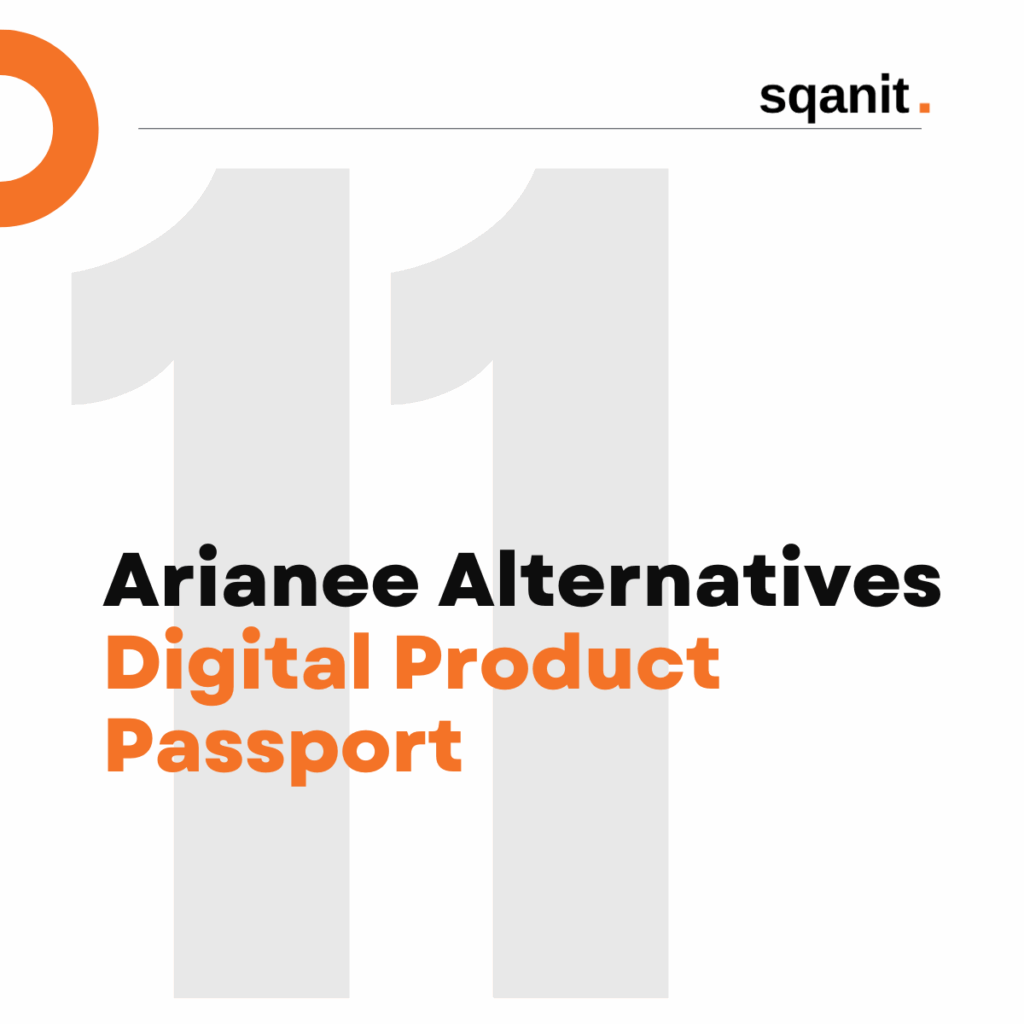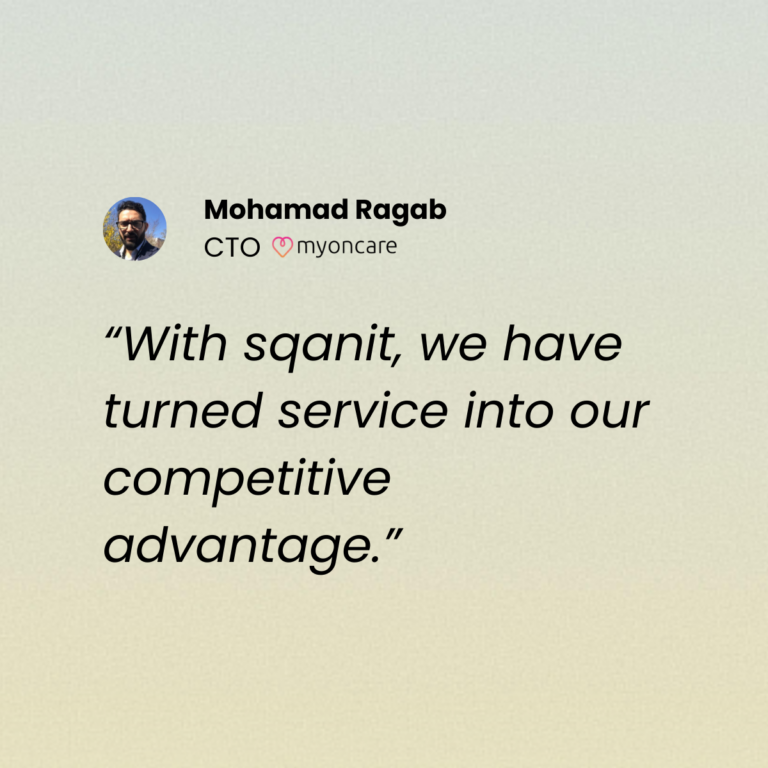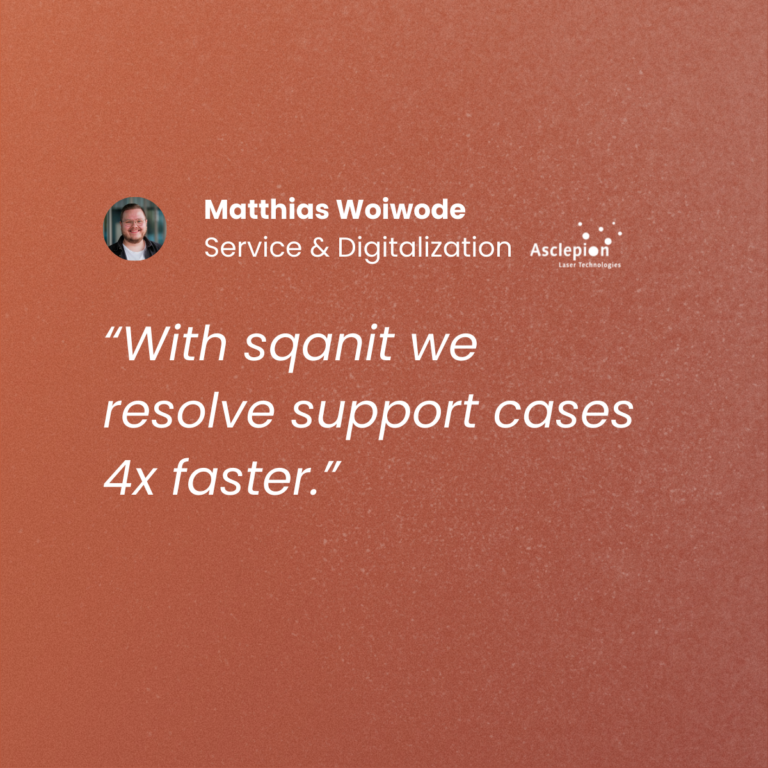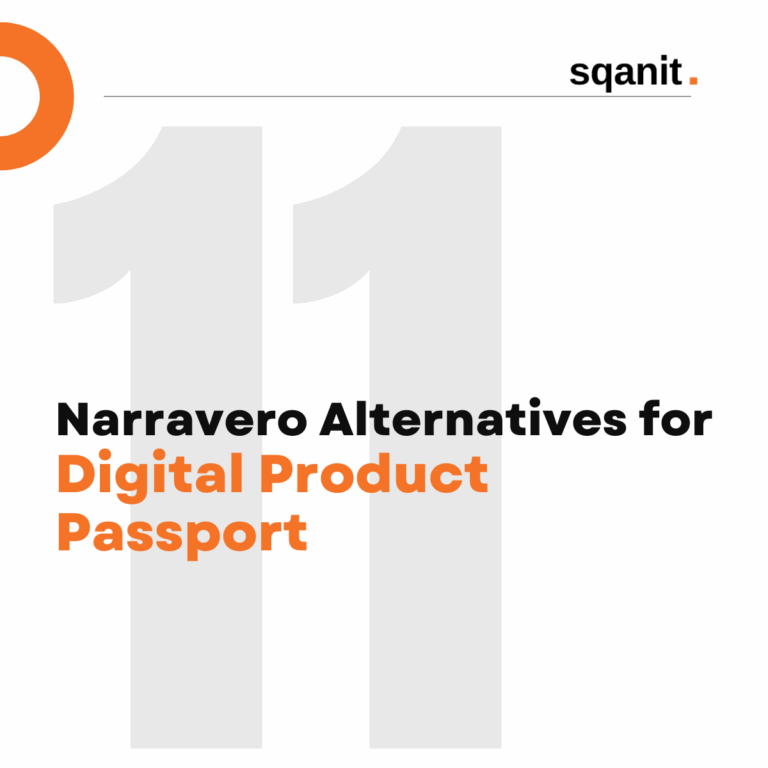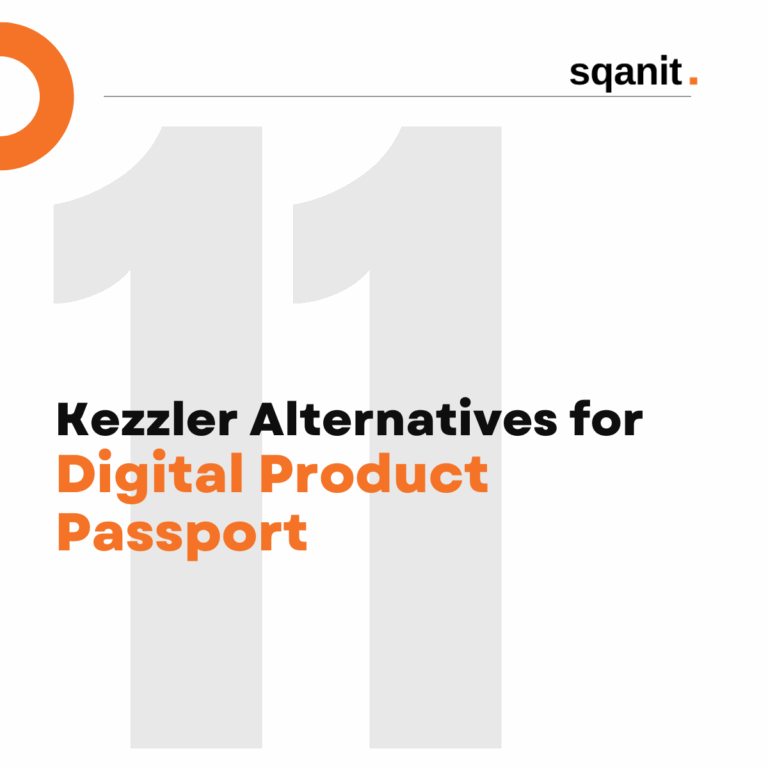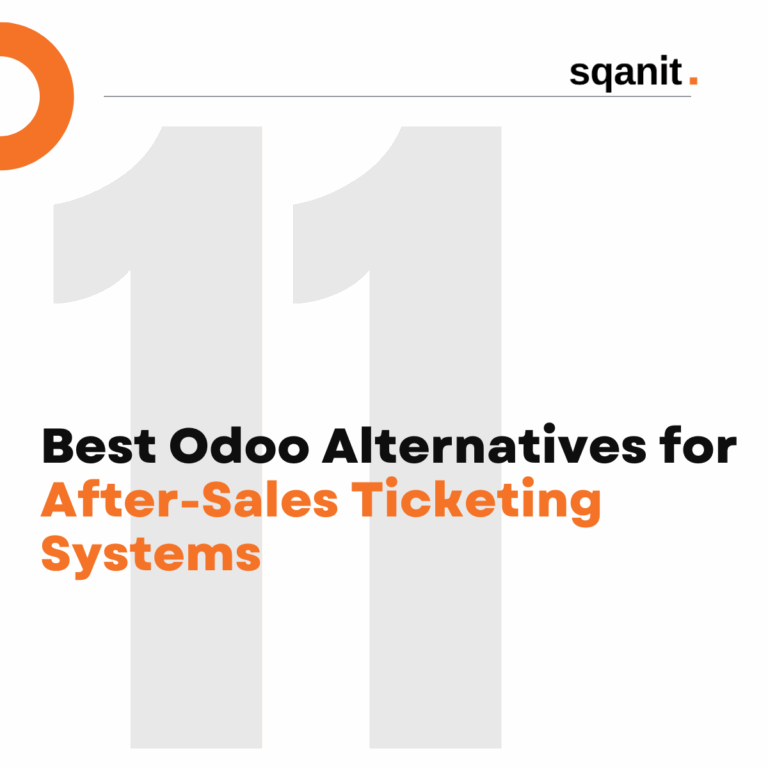When Transparency Becomes a Requirement
Manufacturers of physical goods are facing a double-edged challenge. On one hand, both consumers and legislators are demanding more transparency about a product’s origin, materials, and lifecycle. On the other hand, fragmented data and limited channels to reach end users make it difficult to meet those expectations effectively. Long before a product ever gets repaired, recycled, or returned, direct access to the user is often missing – leading not just to service breakdowns but also to missed opportunities for customer engagement and value creation.
The introduction of the Digital Product Passport (DPP), driven by EU regulations like the Ecodesign for Sustainable Products Regulation (ESPR), is set to fundamentally change this dynamic. The DPP isn’t just a regulatory requirement – it’s a chance to turn a product from a static object into a dynamic hub of information and interaction.
If you’re evaluating the best alternatives to Arianee, this comparison provides a detailed look at how other DPP platforms make an informed choice about which system best fits their needs – whether it’s meeting baseline compliance or leveraging the DPP as a strategic tool for sustainability, brand protection, and customer loyalty.
These top Arianee alternatives also serve as a valuable benchmark for anyone comparing Digital Product Passport software in 2025 – especially if you’re looking for a cheaper alternative to Arianee or seeking more GS1-compliant and interoperable solutions.
Evaluation Criteria: What Really Matters
💡 Technical terms in italics are explained in the glossary below.
| Criterion | What It Means |
|---|---|
| Technology Stack | Core technologies like blockchain, cloud, and IoT – and how they impact flexibility and data security. |
| Industry Focus | Specific industries and verticals the provider specializes in. |
| Data Model Compatibility | Support for GS1, EPCIS, or EU DPP formats. |
| Interoperability & APIs | Integration with ERP, PIM, and ecosystems. |
| UX & UI | Easy to use for internal teams and end users. |
| Maturity | Track record, size, and reference projects. |
| GDPR & EU Compliance | Meets data privacy and EU regulations. |
| Scalability | Handles high product and data volumes. |
| Target Audience | OEMs, brands, retailers, end customers. |
| Pricing Transparency | Public, project-based, or subscription. |
Arianee vs Other DPP Providers: A Quick Comparison
In the tables below, we’ve compared Arianee to other leading DPP solution providers based on key criteria. This is helpful for teams conducting a broader Arianee comparison or seeking a more scalable EU Digital Product Passport tool.
Core Technologies & Industry Fit
| Provider | Technology Stack | Industry Focus |
|---|---|---|
| Arianee | Blockchain-based | Luxury & Fashion |
| Circularise | Blockchain, Cloud | Circular economy |
| Digital-Link | Cloud SaaS | Consumer goods, retail |
| EON | Cloud, IoT (RFID/NFC) | Fashion & Apparel |
| info.link | Cloud SaaS | All label-required industries |
| iPoint-systems | Hybrid (On-Prem/Cloud) | Automotive, Electronics |
| Kezzler | Cloud platform | Consumer goods, pharma |
| Narravero | Cloud SaaS, Blockchain (via partners) | Industry-agnostic |
| Protokol | Web3 stack, Blockchain-first | Fashion, luxury, electronics |
| PSQR | EPCIS database (On-Prem/Cloud) | Regulated industries |
| Scantrust | Cloud, secure QR | Global consumer brands |
| sqanit | Cloud-native SaaS + QR/NFC/AI/AR | Complex durable consumer goods |
Standards & Data Model Compatibility
| Provider | Data Model Compatibilty | Interoperability |
|---|---|---|
| Arianee | Proprietary (NFT), EU-DPP active | Open API/SDKs, Partners |
| Circularise | Proprietary, Zero-Knowledge proofs | APIs, Partner integrations |
| Digital-Link | GS1 Digital Link | API-based, GS1 partner |
| EON | Proprietary (CircularID) | Partner marketplace |
| info.link | GS1, EU-compliant | PIM import, GS1 partner |
| iPoint-systems | IPC, IEC, EU DPP standards | Standard connectors |
| Kezzler | GS1 EPCIS 2.0 | APIs, partner ecosystem |
| Narravero | Flexible, W3C Verifiable Credentials | Integration hub, plugins |
| Protokol | W3C-compliant, EU-aligned | Consulting & integrations |
| PSQR | EPCIS 2.0 | API-first, white-label |
| Scantrust | GS1 Digital Link ready | APIs, partners |
| sqanit | EU DPP formats, GS1 Digital Link-ready | API-first, partner integrations |
Usability & User Experience
| Provider | UX & UI | GDPR & EU Compliance |
|---|---|---|
| Arianee | Brand-driven, mobile wallet app | EU-based, full data control |
| Circularise | B2B-focused | EU-based, publicly funded |
| Digital-Link | Very user-friendly | GDPR and EU-DPP ready |
| EON | Premium UX, fashion-oriented | US-based, with EU projects |
| info.link | Clean and practical | Germany-based, GDPR-compliant |
| iPoint-systems | Functional, complex | Germany-based, strict compliance |
| Kezzler | Improved (via Scanbuy) | EEA-based, privacy-focused |
| Narravero | Interactive, modern | Germany-based, GDPR-compliant |
| Protokol | Project-based | Netherlands-based, privacy-first |
| PSQR | Technical, backend-oriented | Denmark-based, low GDPR risk |
| Scantrust | Mature, configurable | Switzerland-based, EU hosting |
| sqanit | Extremely user-friendly (end users & service) | EU & GDPR-compliant, based in Germany |
Scalability & Maturity
| Provider | Maturity & References | Scalability |
|---|---|---|
| Arianee | Highly mature in luxury fashion | Blockchain-dependent |
| Circularise | Innovative, with selective traction | Supply chain B2B |
| Digital-Link | Young but experienced team | Highly scalable |
| EON | Thought leader | Enterprise-ready |
| info.link | Market-ready, backed by GS1 | Multi-tenant, bulk scale |
| iPoint-systems | Well-established | Highly scalable |
| Kezzler | Highly mature, proven | Extremely scalable |
| Narravero | Established innovator | Highly scalable |
| Protokol | Relatively new | Project-dependent |
| PSQR | Highly established | High performance |
| Scantrust | Established scale-up | Globally scalable |
| sqanit | Young, but with Fortune 500 references | Globally scalable |
Target & Pricing
| Provider | Target Audience | Pricing Transparency |
|---|---|---|
| Arianee | Brand manufacturers | Not transparent |
| Circularise | OEMs, material suppliers | Not transparent |
| Digital-Link | SMEs to large enterprises | Highly transparent |
| EON | Fashion brands | Not transparent |
| info.link | Manufacturers, retailers | Partially transparent |
| iPoint-systems | Large enterprises, tier-1 suppliers | Not transparent |
| Kezzler | Manufacturers, brand owners | Not transparent |
| Narravero | Mid-size to large enterprises | Not transparent |
| Protokol | Innovation leads | Project-based |
| PSQR | Governments, large-scale industry | Not transparent |
| Scantrust | Brand manufacturers | Relatively non-transparent |
| sqanit | SMEs to enterprises, product/marketing teams | Flexible project-based |
Analysis & Insights of Arianee Alternatives: What Works for Whom
Arianee

Headquartered in Paris and founded in 2017/2018, Arianee focuses on the luxury and fashion industry, while also expanding into consumer goods such as electronics.
Technology Stack: Built on a blockchain protocol (Ethereum/EVM-based) and using proprietary ARIA20 tokens, Arianee offers an open-source infrastructure alongside enterprise SaaS solutions. Tokenized digital twins (NFT-based product passports) allow for authentication and ownership management.
Core Features: Beyond authentication and ownership tracking, Arianee provides APIs for integration and passport data access. The passport can log post-sale events such as repairs, resales, rentals, or recycling, and serves as a direct channel to the end user for personalized content and loyalty programs.
Unique Selling Points: As a Web3 pioneer in luxury, Arianee was early to embrace NFT-based passports. The combination of open-source protocol and commercial SaaS results in an open ecosystem with turnkey services. There’s a strong emphasis on data sovereignty and decentralization.
Strengths:
- First-mover advantage in Web3 for luxury
- Strong support for authenticity and customer loyalty via NFT passports
- Hybrid open-source and commercial ecosystem
- High brand recognition and premium clientele in fashion
Weaknesses:
- Proprietary data model focused on blockchain, not GS1 – limiting compatibility
- Higher complexity for end users due to wallet/blockchain requirements
- Primarily relevant to luxury and fashion, less adaptable to other sectors
Alternative Approaches: Companies looking for GS1-based alternatives to the Arianee platform will find flexible SaaS models from providers like Digital-Link or info.link, both offering easier integration and standards alignment. In addition, open-source Digital Product Passport platforms such as Circularise or Protokol are gaining traction – especially where interoperability, regulatory scalability, and data control are critical.
Best Fit For: Luxury and fashion brands looking to build direct customer relationships and reinforce authenticity through innovative services like NFT passports.
sqanit as Arianee alternative
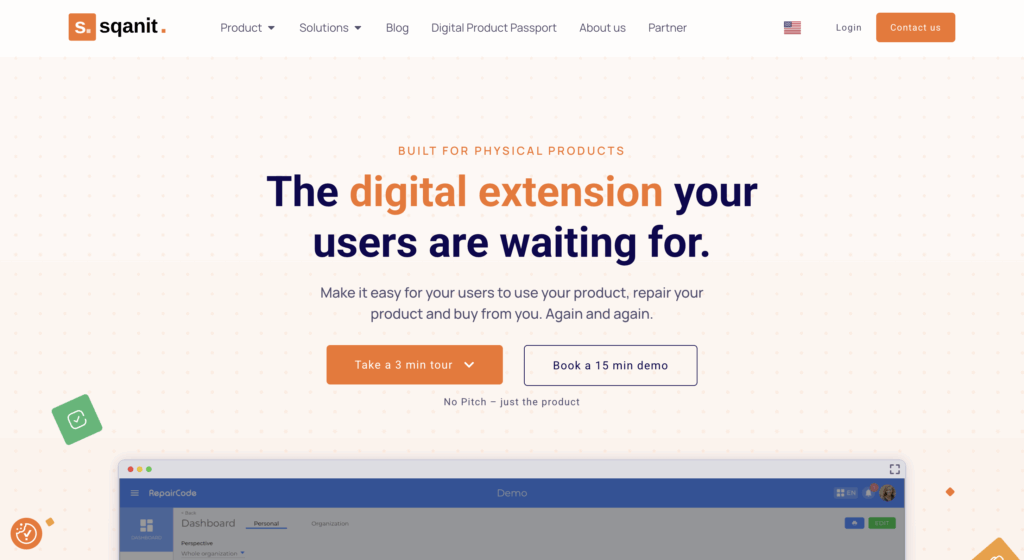
Founded in 2018 and based in Munich, Germany, sqanit enables manufacturers to meet EU DPP requirements while using the DPP as a tool for customer engagement and service improvement. It supports complex and consumer-facing products across multiple industries.
Technology Stack: A modern, cloud-native SaaS platform delivered as a Progressive Web App (PWA). Users access the DPP and service tools via QR code or NFC tag – no app download or login required. Built as API-first and using standard web tech, it integrates with ERP, PLM, and CRM systems with minimal IT overhead.
Core Features: sqanit enables companies to collect product data per EU regulations and generate compliant DPPs. It also offers interactive tools like an AI-powered chatbot, AR-based remote support, and integrated ticketing – accessible via QR.
Unique Selling Points: End users get direct DPP access via QR without needing an app or login. Data integration is streamlined, and the platform focuses on reducing support time and service costs through user-first design.
Strengths:
- Strong focus on EU compliance
- User-friendly UX for both consumers and service teams
- Easy integration with existing systems
- Flexible, modern tech stack
Weaknesses:
- No native blockchain functionality
- Less focus on complex multi-tier partner workflows
- Limited offline functionality
- Pricing is not publicly disclosed
Best Fit For: Manufacturers of complex or consumer-facing products who want to combine compliance with enhanced customer experience and service efficiency.
Circularise as Arianee alternative

Founded in 2016 and based in The Hague, Netherlands, Circularise targets the circular economy – particularly in plastics, chemicals, automotive, and battery sectors where proof of material origin and recycling is critical.
Technology Stack: A blockchain-based platform (public or consortium-led) enabling tamper-proof audit trails. A key differentiator is its patented “Smart Questioning” technology, which uses zero-knowledge proofs to selectively share sensitive data without revealing trade secrets.
Core Features: Circularise enables full traceability of materials and supply chains, logging sustainability data such as CO₂ footprints, recycled content, and certifications. The zero-knowledge framework ensures data confidentiality while still allowing verified compliance and sustainability claims.
Unique Selling Points: Circularise’s approach to privacy through zero-knowledge proofs is highly distinctive. Backed by EU funding, it positions itself as a key enabler of cross-product circular transparency.
Strengths:
- Innovative zero-knowledge data sharing across supply chains
- Strong sustainability focus backed by EU support
- Ideal for industries with sensitive data and complex chains
Weaknesses:
- Proprietary data model, currently not GS1–EPCIS aligned
- UI/UX tailored more to engineers and B2B stakeholders, not consumers
- Market presence still limited despite strong tech
Best Fit For: OEMs and material suppliers with complex supply chains, especially sustainability and supply chain managers needing verified material and recycling records.
Digital-Link (Connexum) as Arianee alternative

Founded in 2022 and based in New York City, Digital-Link benefits from a team with QR expertise dating back to 2009. It targets consumer goods and retail, especially FMCG, apparel, cosmetics, and electronics packaging.
Technology Stack: A fully cloud-based SaaS platform built on the GS1 Digital Link web standard (standardized URLs for product IDs). No blockchain involved.
Core Features: Includes QR code management, GS1 Digital Link QR generation, and automatic creation of product-specific landing pages for the Digital Product Passport (DPP) with no coding required. Features include dynamic content, redirects, and integration with product data sources.
Unique Selling Points: With a low barrier to entry, self-service model, and a free tier, Digital-Link offers strong pricing transparency. The no-code page builder is tailored for DPP and regulatory content, with built-in multilingual support.
Strengths:
- Extremely easy to use, low barrier to entry
- Full GS1 Digital Link alignment ensures high compatibility
- Transparent SaaS pricing, including a free plan
- No coding required for DPP basics
Weaknesses:
- No blockchain integration
- Less suited for industrial goods or deep supply chain traceability
Best Fit For: A wide range of businesses from SMBs to large enterprises – especially product, marketing, and compliance managers in consumer goods and retail.
EON as Arianee alternative
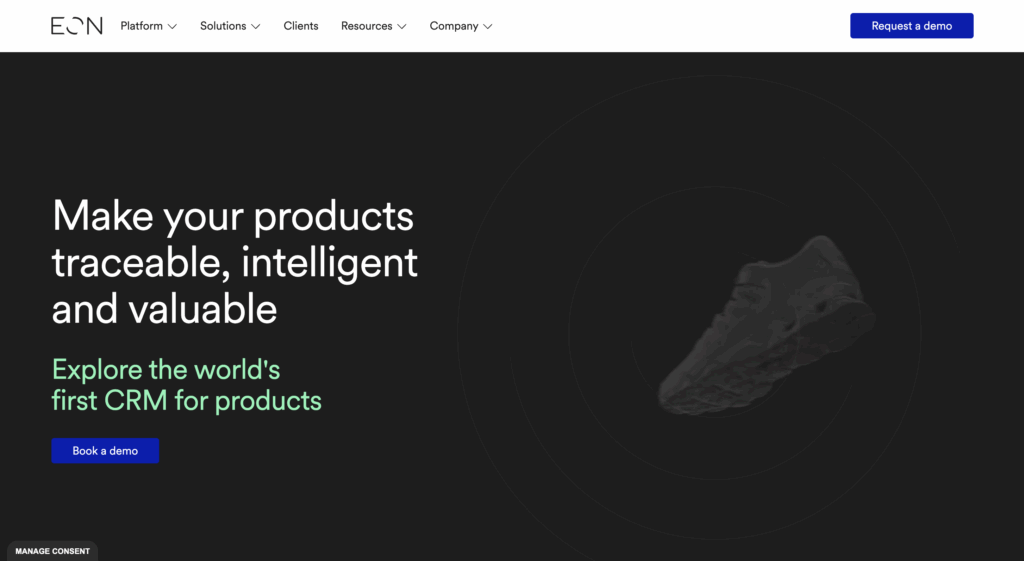
Founded in 2017 and based in New York, EON focuses exclusively on fashion and textiles – particularly sustainable fashion, luxury, and high-street labels.
Technology Stack: EON Product Cloud runs on Microsoft Azure, using RFID/NFC chips or QR codes as physical identifiers. It doesn’t use blockchain but relies on centralized, yet open, data structures.
Core Features: EON delivers Digital Product Passports as “Digital IDs” for garments, combining a digital birth certificate (master data) and lifecycle tracking. It enables traceability via manufacturing and supplier integration, and supports resale, rental, and customer communication.
Unique Selling Points: EON represents the “connected garment” vision, using persistent physical labels for lifecycle traceability. Strategic features like resale and circular commerce are emphasized, alongside a unique partner ecosystem (EON Exchange).
Strengths:
- Pioneer in fashion DPP with IoT integration beyond packaging
- Strong support for circular business models (resale, rental)
- Proven references with major fashion brands (H&M, Chloé, Coach)
- Active in EU DPP standardization efforts
Weaknesses:
- Narrow industry focus (fashion/textiles only)
- Proprietary platform may limit interoperability beyond EON ecosystem
- RFID setup can be resource-intensive
Best Fit For: Fashion brands and retailers – from luxury to fast fashion – implementing circular economy strategies.
info.link as an Arianee alternative

Founded in 2021 and based in Hamburg, Germany, info.link is supported by legal experts and GS1 Germany. The platform is aimed at consumer goods brands across all sectors that need to quickly publish EU-compliant product information.
Technology Stack: A cloud-based SaaS platform optimized for “digital labeling.” It natively uses GS1 Digital Link and includes built-in QR code generation. No blockchain is involved.
Core Features: info.link allows one-click creation of digital product passports, with automatic GTIN validation via “Verified by GS1.” It offers a library of 50+ pre-built content modules (e.g., ingredients, recycling info, carbon footprint). Additional features include branding options, automatic translation into 20+ languages, and future-proof QR code management.
Unique Selling Points: Designed with legal experts, the platform follows a “compliance-as-a-service” model. A robust template system enables fast setup, and integration with existing data sources (PIM, CSV, GDSN) minimizes manual effort.
Strengths:
- Maximum compliance orientation, co-developed with legal professionals
- Fast passport creation using templates and content modules
- Full GS1 Digital Link compatibility and integration with PIM/ERP systems
- Transparency around legal requirements (GDPR, Green Claims, etc.)
Weaknesses:
- No blockchain technology
- Less design flexibility for marketing use cases – compliance takes priority
- Limited international brand recognition despite GS1 backing
- Pricing is not publicly disclosed
Best Fit For: Consumer goods brands of all sizes that need to rapidly roll out compliant product passports – especially product and regulatory affairs managers.
iPoint-systems as Arianee alternative
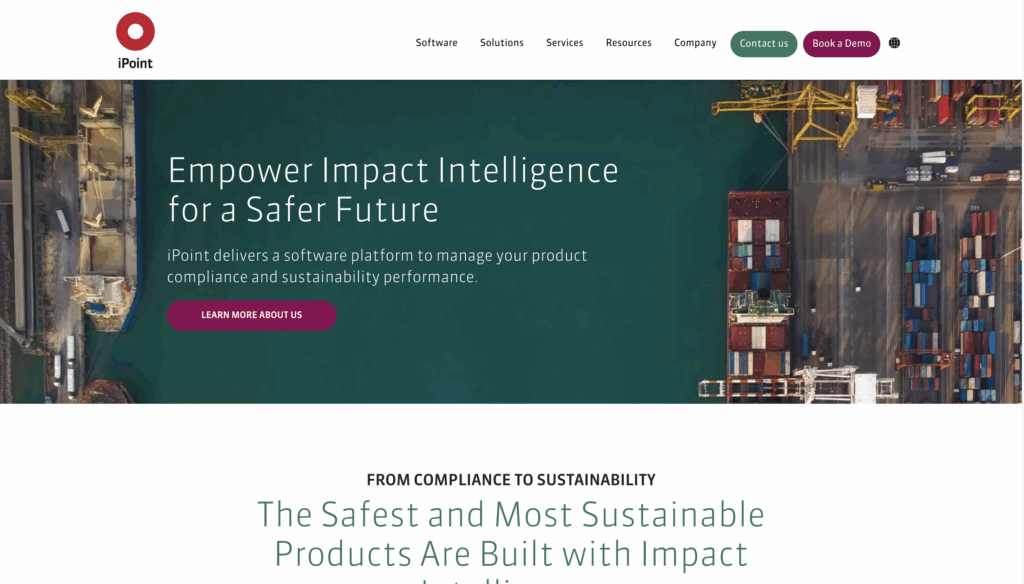
Headquartered in Reutlingen, Germany and founded in 2001, iPoint-systems serves global industrial manufacturers under heavy regulatory pressure – especially in automotive, electronics, chemicals, and aerospace.
Technology Stack: A modular enterprise software suite that combines on-prem and modern cloud services. DPP functionality is provided as a solution layer over existing databases. There is no built-in blockchain; the focus is on centralized data and integration.
Core Features: A centralized data model aggregates sustainability and compliance data from multiple sources into a standardized passport. It includes material composition, carbon footprint, recyclability, and certifications – plus reporting and analytics features.
Unique Selling Points: iPoint offers an all-in-one solution for compliance, sustainability, and circular economy needs. With over 20 years of experience, it plays a key role in defining official EU standards (e.g., Battery Passport).
Strengths:
- Comprehensive coverage of compliance, sustainability, and circularity
- Deep ERP/PLM integration with ready-made connectors
- High domain expertise and trusted by global industry players
- Active in shaping official EU DPP frameworks
Weaknesses:
- Complex UI and steep learning curve
- No out-of-the-box frontend for end users (requires custom development)
- Expensive enterprise solution – less accessible for smaller companies
- B2B-focused, limited appeal for consumer-facing use cases
Best Fit For: Large manufacturers and Tier-1 suppliers in regulated industries needing robust compliance and sustainability management.
Kezzler as Arianee alternative

Founded in 2001 and headquartered in Oslo, Norway, Kezzler operates globally with a strong presence in consumer goods, pharma, agri/chemicals, and luxury/automotive sectors.
Technology Stack: A cloud-based Connected Products Platform designed for mass serialization and event tracking. Kezzler generates and manages billions of unique IDs (QR codes, alphanumeric codes) in a scalable EPCIS-compliant database. A patented secure QR code system supports authentication.
Core Features: Capabilities include serialization, track & trace, anti-counterfeiting, and product recall management. Through its 2023 acquisition of Scanbuy, Kezzler now also offers consumer engagement and smart packaging tools.
Unique Selling Points: Kezzler is recognized for unmatched scalability and end-to-end traceability – from code printing to data analytics. The Scanbuy acquisition enhanced its offering with digital marketing and engagement features.
Strengths:
- Proven scalability – billions of codes tracked annually
- Full solution stack from serialization to data utilization
- Strong GS1 standards alignment (EPCIS 2.0, GTIN)
- Expanded consumer engagement tools via Scanbuy
Weaknesses:
- Pricing not publicly disclosed – enterprise contracts only
- Despite improved UX, complexity remains for smaller teams
- No native blockchain – available via partners only
Best Fit For: Manufacturers and brand owners across industries, especially supply chain and brand protection teams needing large-scale serialization and traceability.
Narravero as Arianee alternative

Based in Münster, Germany, Narravero began development in 2013 and officially launched its platform in 2019. The company targets manufacturers and brands across industries seeking product transparency and direct user engagement.
Technology Stack: A proprietary SaaS platform built on modular architecture. Interactive web apps load in real time upon scan. The integration hub connects to ERP, PIM, and e-commerce systems. Blockchain components (NFTs, Verifiable Credentials) are optional via Crossmint.
Core Features: Narravero offers a complete DPP solution – from data collection to customer-facing interactivity. The solution includes DPP strategy & compliance, traceability, content studio, production tools, and lifecycle touchpoints. Passports work without login or apps and can double as marketing tools for cross-selling or lead capture.
Unique Selling Points: Narravero uniquely combines DPP functionality with marketing engagement. Their “speaking products” concept turns DPPs into interactive brand experiences. Proven scalability and login-free UX are key highlights.
Strengths:
- Seamless integration of compliance and marketing in a single DPP solution
- Full-service offering from consulting to content creation
- Scalable infrastructure with millions of interactions
- Blockchain-ready credentials (W3C) for future EU compliance
Weaknesses:
- Brand awareness still limited outside Germany
- Pricing not transparent – custom quotes only
- May require custom integration work for complex ERP/PLM environments
Best Fit For: Mid-size to enterprise manufacturers and brands aiming to combine compliance, transparency, and digital engagement through product passports.
Protokol as Arianee alternative

Based in Amsterdam and founded in 2020, Protokol was launched by Web3 experts targeting sectors where blockchain adds value – fashion, electronics, batteries, luxury, and lifestyle.
Technology Stack: Protokol creates custom blockchain solutions using Ethereum, Polygon, or ARK’s framework. Its DPPs include NFTs, smart contracts, and self-sovereign identity (SSI). It’s primarily a consulting + development partner, not an out-of-the-box tool.
Core Features: Blockchain-based product passports certify ownership and log lifecycle events immutably. The platform supports smart contracts and can integrate DeFi/tokenomics to incentivize recycling and circular behaviors.
Unique Selling Points: A blockchain-first approach with high flexibility and future-proof infrastructure. DPPs as NFTs allow for unique customer ownership experiences. Protokol delivers tailored strategies and technical execution.
Strengths:
- Web3-native approach with strong data integrity and authenticity
- Customizable solutions for complex integrations
- Enables new business models via smart contracts (royalties, resale)
- Deep blockchain expertise, including EU consultations
Weaknesses:
- No ready-made product – everything is project-based
- UX quality varies by project – no standard frontend
- High implementation costs due to custom development
- No public reference DPP deployments yet
Best Fit For: Visionary companies exploring Web3, especially innovation leads and forward-thinking CEOs willing to invest in tailored blockchain solutions.
PSQR (ProductSecure, Saga) as an Arianee alternative
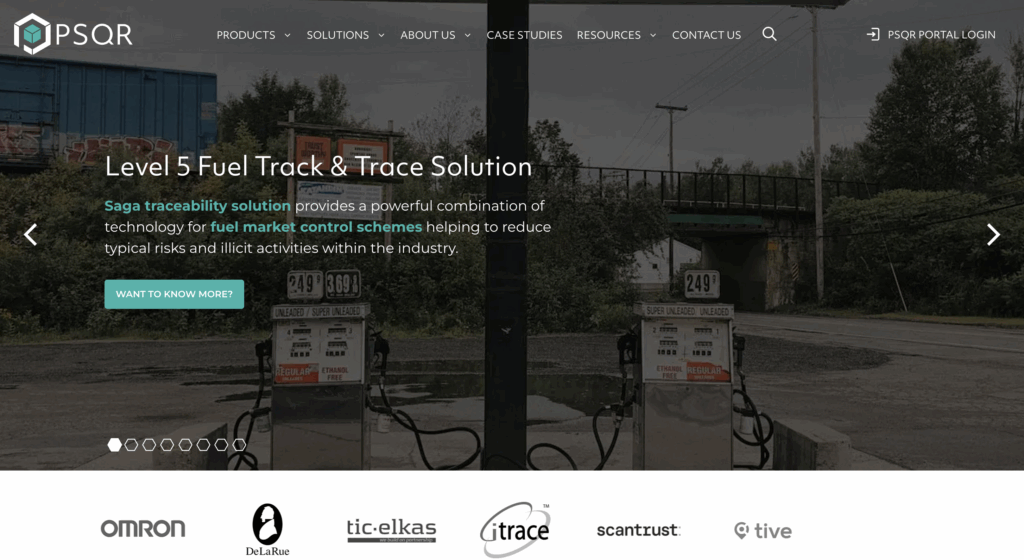
Founded in 2016 and based in Copenhagen, Denmark, PSQR targets enterprises and governments needing large-scale track & trace systems. It’s active in regulated sectors such as tobacco, pharma, food & beverage, and textiles.
Technology Stack: PSQR’s core is “Saga,” a high-performance EPCIS database tracking over 25 billion items annually. The solution is cloud-agnostic, built on standard databases, and includes the Saga mobile app. Blockchain is not used – focus is on GS1 standards (EPCIS, CBV).
Core Features: Saga supports serialized supply chain event management, including anomaly alerts, serial number pool management, and real-time lifecycle data. It can serve as the data backbone for a DPP, especially in regulated environments.
Unique Selling Points: PSQR excels in performance and scalability, with proven success in large national and industry systems (e.g., EU tobacco track & trace). It often works as a white-label provider for partner platforms.
Strengths:
- Unmatched scalability and real-time performance
- Full GS1 EPCIS 2.0 compliance for global interoperability
- Trusted in government and enterprise-grade projects
- Customizable platform for vertical- or region-specific needs
Weaknesses:
- No consumer-facing DPP frontend – must be custom-built
- No blockchain integration
- Minimal UX focus for end users
- Not available as a plug-and-play SaaS – enterprise project model only
Best Fit For: Governments and large industrial consortia building their own global track & trace infrastructures.
Scantrust as an Arianee alternative

Founded in 2014 and based in Lausanne, Switzerland (with offices in Shanghai and Bangkok), Scantrust targets global brands seeking brand protection, supply chain visibility, and consumer engagement.
Technology Stack: A cloud-based Connected Packaging Platform using patented secure QR codes with copy-protection. The backend is a multi-tenant SaaS that manages campaigns, landing pages, and track & trace data.
Core Features: Scantrust provides QR code generation, scan-based anti-counterfeiting, and consumer engagement tools via a built-in landing page builder. The system can be used to power DPPs with all regulatory content included.
Unique Selling Points: Its secure QR technology is ideal for high-value products needing copy-protection. Scantrust combines marketing and compliance in a one-stop connected packaging solution.
Strengths:
- Patented secure QR codes for anti-fraud and brand protection
- Combines compliance (DPP) and consumer engagement
- Scalable for millions of items and global brand rollouts
- Broad partner network for turnkey packaging integrations
Weaknesses:
- GS1 Digital Link support not clearly advertised
- Limited pricing transparency – custom quotes typical
- Blockchain features are optional and in pilot stage only
Best Fit For: Brand manufacturers needing anti-counterfeiting, DPP functionality, and marketing all in one platform.
sqanit as Arianee alternative
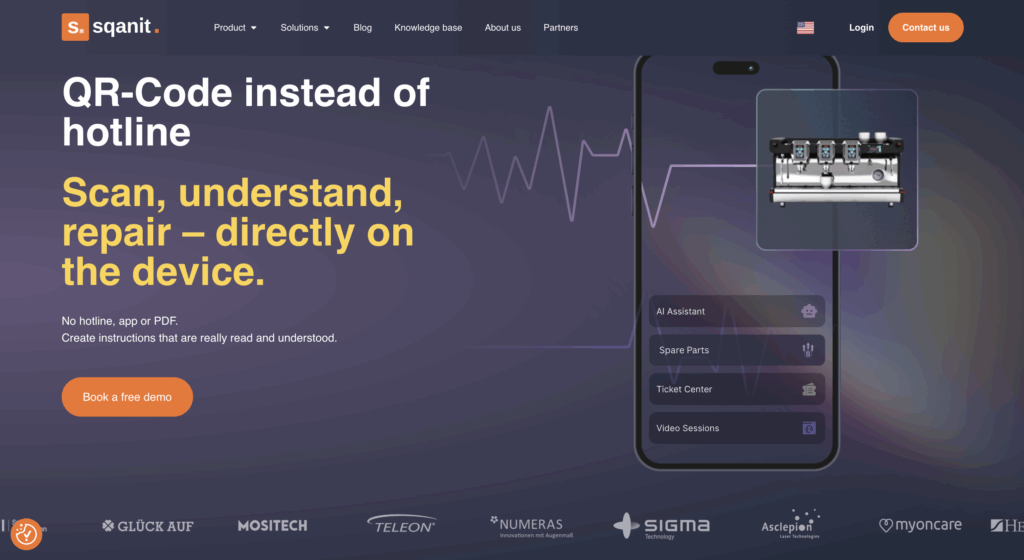
Founded in 2018 and based in Munich, Germany, sqanit enables manufacturers to meet EU DPP requirements while using the DPP as a tool for customer engagement and service improvement. It supports complex and consumer-facing products across multiple industries.
Technology Stack: A modern, cloud-native SaaS platform delivered as a Progressive Web App (PWA). Users access the DPP and service tools via QR code or NFC tag – no app download or login required. Built as API-first and using standard web tech, it integrates with ERP, PLM, and CRM systems with minimal IT overhead.
Core Features: sqanit enables companies to collect product data per EU regulations and generate compliant DPPs. It also offers interactive tools like an AI-powered chatbot, AR-based remote support, and integrated ticketing – accessible via QR.
Unique Selling Points: End users get direct DPP access via QR without needing an app or login. Data integration is streamlined, and the platform focuses on reducing support time and service costs through user-first design.
Strengths:
- Strong focus on EU compliance
- User-friendly UX for both consumers and service teams
- Easy integration with existing systems
- Flexible, modern tech stack
Weaknesses:
- No native blockchain functionality
- Less focus on complex multi-tier partner workflows
- Limited offline functionality
- Pricing is not publicly disclosed
Best Fit For: Manufacturers of complex or consumer-facing products who want to combine compliance with enhanced customer experience and service efficiency.
Tailored Recommendations by Company Profile
Choosing the right DPP provider depends heavily on a company’s individual strategy, existing IT landscape, and key priorities.
| Company Profile | Recommendation |
|---|---|
| Manufacturers with a Primary Focus on Compliance | For companies that need to quickly and efficiently meet EU requirements without launching large IT projects, info.link and Digital-Link are ideal. info.link offers plug-and-play compliance with legally vetted content modules, while Digital-Link shines with GS1 alignment and a self-service approach. Scantrust adds brand protection on top of compliance, making it a strong choice for OEMs. |
| Innovation-Driven Brands (Web3 & Customer Engagement) | Brands looking to use the DPP as a strategic channel for customer interaction or new business models should explore Arianee, Narravero, EON, and sqanit. Arianee pioneered NFT-based passports for luxury and loyalty. Narravero transforms the passport into an interactive marketing touchpoint. EON blends IoT-enabled tags with circular commerce in fashion. sqanit bridges DPP and customer service. |
| Companies with Complex Supply Chains & Sustainability Goals | For industries requiring deep transparency into materials and sustainability data, Circularise, iPoint-systems, and PSQR stand out. Circularise uses zero-knowledge proofs for secure data sharing. iPoint is a leader in compliance and sustainability data for large OEMs. PSQR provides a GS1-compliant, high-performance backend for large-scale track & trace operations. |
| Manufacturers with High Brand Protection Needs | Brands looking to fight counterfeiting and ensure product authenticity benefit from Kezzler and Scantrust. Kezzler provides serialization and authenticity verification at scale. Scantrust stands out with patented secure QR codes that offer robust copy protection. |
| Enterprises with Complex, Established IT Infrastructure | For large organizations looking to integrate the DPP into existing ERP, PLM, or MES systems, iPoint-systems, Kezzler, and PSQR are highly suitable. iPoint is built for deep enterprise integration. Kezzler and Scantrust have proven their reliability in live production and supply chain environments. Protokol can deliver custom blockchain integrations but follows a project-based consulting model. |
Final Thoughts: Key Takeaways & Common Pitfalls
From cost-effective SaaS tools to open-source platforms and enterprise-grade compliance engines, the Digital Product Passport landscape is quickly maturing. Whether you’re comparing platforms for interoperability, pricing or UX, these top 2025 DPP tools help manufacturers make better, faster decisions.
Key Takeaways:
- Compliance Meets Customer Experience: The DPP is evolving beyond a pure regulatory tool into a powerful lever for customer engagement and marketing. Platforms like Narravero and sqanit are leading the way – transforming compliance requirements into interactive user experiences.
- GS1 Digital Link Dominance: The rapid adoption of GS1 Digital Link by most standards-driven providers signals a more harmonized future. Expect DPP systems to increasingly communicate via shared URIs (unified resource identifier), streamlining interoperability across ecosystems.
- A Spectrum of Technology Stacks: From pure cloud SaaS platforms to hybrid models and blockchain-native architectures, the DPP landscape offers a broad range of approaches – each catering to different needs around decentralization, auditability, and data ownership.
What’s Often Overlooked
Despite the buzz around innovative features and new tech, the effectiveness of any DPP solution ultimately depends on the quality of the data it holds. Many companies underestimate the effort required to consolidate fragmented product information, close data gaps, and establish internal ownership for ongoing updates. Even the best platform fails if material data is incomplete or repair logs aren’t maintained.
Our advice
Don’t treat the DPP as just another software project. Before choosing a tool, audit your internal data landscape. Identify who owns what data, how often it gets updated, and how to ensure long-term maintenance. Only with clean, well-managed data can the DPP deliver real transparency and trust. In short: The DPP journey isn’t primarily an IT project – it’s a strategic transformation that spans your entire value chain and customer relationship.
Next Step: Get Your Free Consultation
Why 30 Minutes Can Save Months
- Status Check: We’ll assess where your organization stands on the DPP journey in just a few simple questions.
- Make Sense of EU Regulations: Understand which rules actually apply to your business – ESPR, CSRD, GS1 Digital Link, and more.
- Quick-Win Roadmap: Get practical next steps to improve transparency and compliance immediately.
- Time & Budget Framework: We’ll outline a realistic project plan, including resource and cost indicators.
Outcome: You’ll leave the call with clarity on where to start – and whether or when sqanit might be the right partner for you.
FAQs
What are the alternatives to Arianee’s Digital Product Passport?
Arianee is not the only player in the DPP space. Depending on your needs, alternatives include:
- GS1-based solutions like Digital-Link, info.link and Kezzler, which offer broader interoperability and easier integration into supply chains.
- Specialized tools such as:
- Circularise – strong on material traceability and sustainability data
- EON – tailored to fashion and textiles with IoT/RFID integration
- Narravero and sqanit – both combine EU compliance with interactive user experiences, turning the DPP into a customer-facing channel rather than just a regulatory requirement
What are the best alternatives to Digital Product Passport solutions?
The “best” alternative depends on your goals:
- If you’re focused on fast, compliant implementation, Digital-Link, info.link and Scantrust are top choices – especially for OEMs and brands under regulatory pressure.
- For innovation-driven strategies, consider:
- Circularise – supply chain sustainability
- sqanit – DPPs as a marketing channel
- EON – circular economy for fashion
- Arianee – consumer engagement through Web3/NFT
Which Digital Product Passport providers are compliant with EU regulations?
Several providers are explicitly aligned with EU regulations:
- sqanit is purpose-built for ESPR and other upcoming EU rules.
- info.link was developed with legal partners and adheres strictly to EU law.
- Digital-Link is GS1-aligned and EU-DPP-ready.
- iPoint-systems actively contributes to EU battery passport specs.
Is there a cheaper alternative to Arianee’s DPP software?
While Arianee uses a project-based pricing model (typically for premium brands), several other providers offer cost-effective entry points:
- Digital-Link – public pricing and a free tier make it highly accessible.
- info.link and sqanit – enable fast onboarding without large budgets or IT investments.
How does Arianee compare to other DPP tools?
Arianee is unique in its use of blockchain and NFTs, especially in luxury and fashion. It excels at ownership management and decentralized identity – ideal for direct-to-consumer engagement.
However, its proprietary blockchain-first data model makes GS1 integration harder. By contrast, most other DPP platforms rely on open, GS1-based standards, allowing for broader interoperability across industries.
Can small manufacturers implement affordable DPP solutions?
Several providers offer DPP software designed for SMEs:
- Digital-Link offers a free plan with full GS1 QR functionality.
- info.link delivers plug-and-play compliance with minimal setup.
- sqanit is ideal for teams without in-house developers – setup is quick and intuitive.
What features should I look for in a Digital Product Passport provider?
- Technology – cloud-native vs. blockchain-first
- Standards – GS1, EPCIS, EU-DPP readiness
- Integration – API-first, ERP/PIM compatibility
- UX/UI – both for internal teams and end users
- Compliance – GDPR, ESPR, and other EU directives
- Scalability – is it built for growth?
- Transparency – clear pricing, no hidden fees
Glossary
API (Application Programming Interface)
A set of tools and protocols that allow different software applications to communicate and exchange data with each other.
Blockchain
A decentralized and tamper-proof technology that stores data in cryptographically linked blocks. Commonly used to securely record product histories or transactions.
Digital Product Passport (DPP)
A digital record that stores and presents important information about a product throughout its entire lifecycle, such as origin, materials, repairs, and recycling events – often mandated by EU regulations.
EPCIS (Electronic Product Code Information Services)
A global GS1 standard for sharing event data in the supply chain to provide end-to-end product traceability.
ESPR (EU Sustainable Products Regulation)
An EU directive aimed at making products more sustainable by mandating transparency and the implementation of Digital Product Passports for certain product categories.
GS1 Digital Link
A global GS1 standard that connects physical products to digital content via web links—typically using QR codes that lead to product-specific landing pages.
Interoperability
The ability of different systems, applications, or devices to work together and exchange data seamlessly, regardless of the provider.
IoT (Internet of Things)
A network of physical objects embedded with sensors, software, and other technologies that connect and exchange data over the internet.
MES (Manufacturing Execution System)
Software that monitors and controls manufacturing processes in real time, improving efficiency, quality, and traceability in production.
NFC (Near Field Communication)
A wireless communication technology enabling data exchange over short distances (a few centimeters), commonly used in contactless payments and product tagging.
NFT (Non-Fungible Token)
A unique digital asset stored on a blockchain that represents ownership, authenticity, or specific rights associated with a physical or digital object.
OEM (Original Equipment Manufacturer)
A company that produces products or components that are later marketed by another company under its own brand.
Proprietary Data Model
A closed data structure controlled by the developer or provider, with limited public access or compatibility.
RFID (Radio-Frequency Identification)
A technology that uses radio waves to read and capture data from tags attached to objects, often used for inventory and asset tracking.
SDK (Software Development Kit)
A collection of software tools and libraries provided to developers for building applications on a specific platform or system.
Smart Contracts
Self-executing agreements written in code and stored on a blockchain, which automatically enforce contract terms without human intervention.
SSI (Self-Sovereign Identity)
A decentralized identity model where individuals control their digital identity and decide when and with whom to share it.
Tamper-Proof Labels
Security labels that visibly indicate any attempt at removal or tampering, used to protect against counterfeiting.
Token / Tokenization
The process of converting a physical or digital asset into a digital token stored on a blockchain, representing ownership or specific rights.
Track & Trace
The process of capturing and monitoring product movements across the supply chain to ensure full visibility of origin, location, and flow.
Verifiable Credentials (VCs)
Cryptographically secured digital proofs that allow one party to confirm a claim about a person or object without disclosing unnecessary information.
Web3
The next evolution of the internet, built on decentralized technologies like blockchain, aimed at giving users more control over their data, identity, and digital assets.
